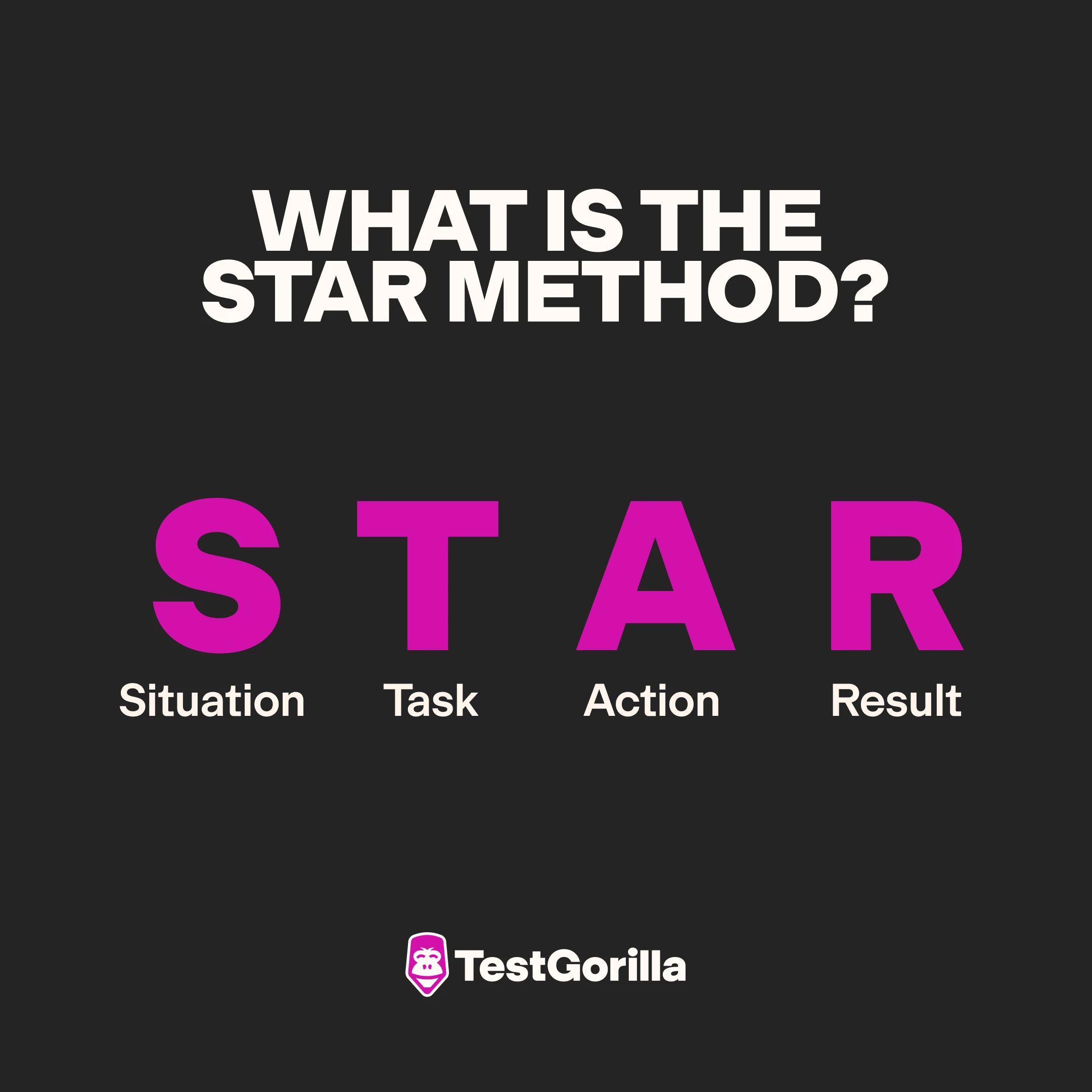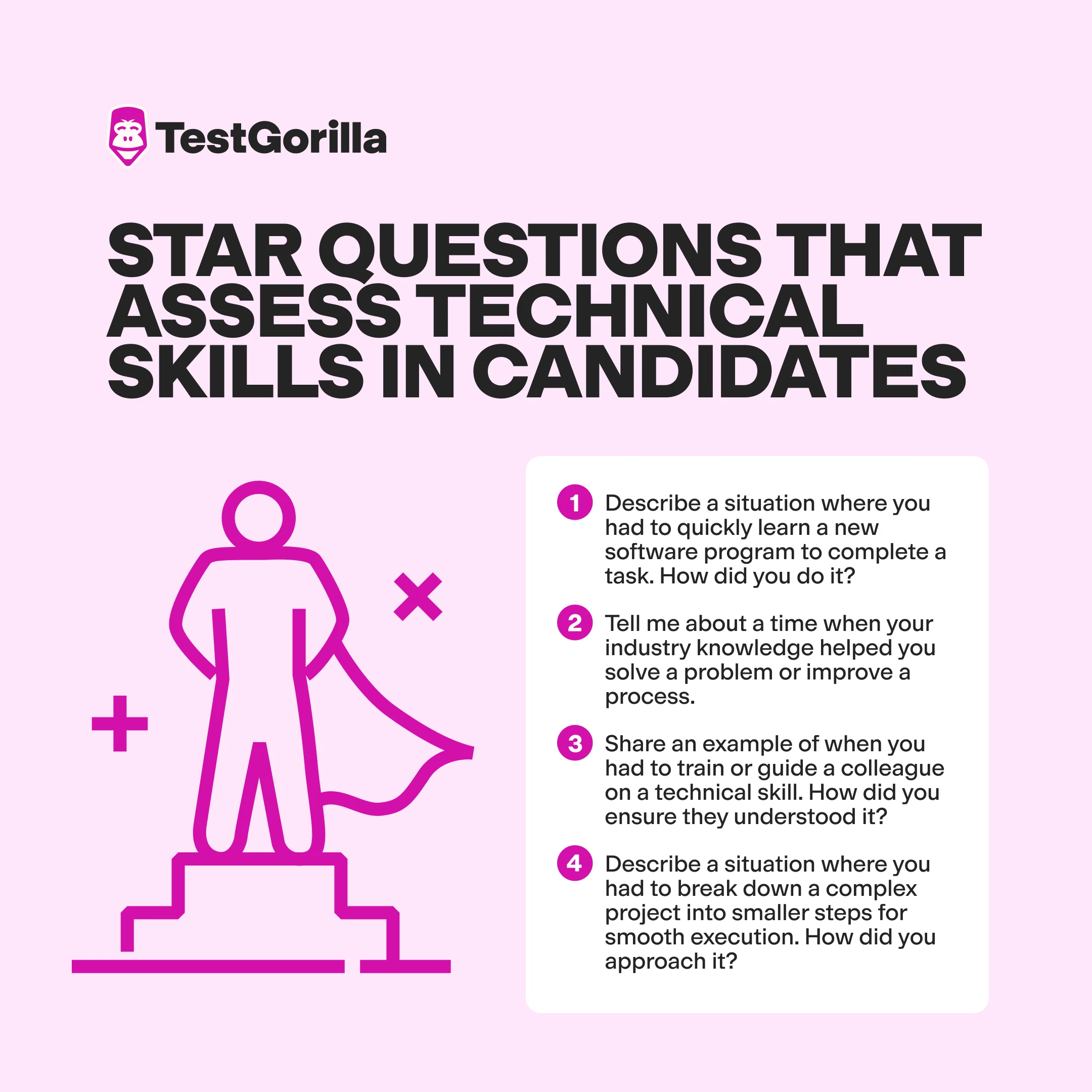25 STAR interview questions and answers for hiring top talent
Complement STAR interviews with TestGorilla's pre-employment tests
Many employers struggle with interviewing – despite it being one of the most critical parts of the hiring process. Interviewer biases, unstructured tangents, and dishonest candidate answers taint decision-making and often lead to mis-hiring. The result? Disrupted work, low team morale, and high replacement costs.
Luckily, there’s a clear-cut way to avoid these risks: the STAR interviewing technique.
Below, we explain what STAR interview questions are and how they help to structure and strengthen the interview process. We also share 25 tried-and-tested STAR interview questions and answers.
What is the STAR interviewing technique?
The STAR method is an interview answering technique developed by Tom Janz, a Canadian psychologist. It provides candidates with a structured way to respond to behavioral interview questions about experiences and challenges they’ve faced in the past.
In this method, candidates use the STAR acronym to structure their answers and ensure each response is as complete as possible.
So, what is STAR?
Situation: The candidate sets the scene by explaining which particular situation or problem they were dealing with, when, why, and so on.
Task: They describe their responsibility to address the situation or solve the problem.
Action: They detail their approach, decision-making, and the steps they took to tackle the situation or problem.
Result: Candidates end by sharing the outcome of their actions, including achievements and lessons learned.
While the STAR method was devised to help candidates, it’s also shaped how employers ask questions. To elicit STAR-style responses, you must ask questions, such as “Tell me about a time when…” or “Describe a situation where you…”
These questions push candidates to give concrete and complete examples – making it harder for them to be dishonest about their experiences.
Plus, answers provide insights about how candidates might handle similar scenarios in your company in the future.
One study even found that structured interviews (like those that use planned questions for eliciting STAR-style responses) are among the strongest predictors of future job performance.
Finally, STAR interviews help reduce time-to-hire by keeping the interview process on track. They also eliminate biases by providing clarity on what to look for in good interview answers.
25 STAR interview questions and answers
Here are 25 well-rounded STAR interview questions and ideal answers that can help you evaluate everything from your candidates' hard and soft skills to their cognitive abilities and personality traits. Strong candidates will be detailed about the situations they faced, the tasks they took on to resolve them, the actions they took to complete these tasks, and the end results.
4 technical skills questions
These interview questions can help you assess if candidates have the specific expertise, knowledge, and hard skills needed to perform their jobs. This could include software proficiency, product and industry knowledge, and so on.
Good candidates will demonstrate familiarity with relevant software and tools. They'll have a proactive approach to learning and staying updated with industry knowledge and trends – for instance, through peer learning, online courses, hands-on experimentation, and so on.
Also, look for specific examples of how candidates applied their expertise to achieve individual or team goals, solve problems, improve business processes, and help others.
Here are some STAR interview questions and answers to measure candidates’ technical skills and abilities.
Describe a situation where you had to quickly learn a new software program to complete a task. How did you do it?
Tell me about a time when your industry knowledge helped you solve a problem or improve a process.
Share an example of when you had to train or guide a colleague on a technical skill. How did you ensure they understood it?
Describe a situation where you had to break down a complex project into smaller steps for smooth execution. How did you approach it?
6 soft skills and situational judgment questions
Soft skills interview questions are a great way to evaluate crucial transferrable skills and traits like communication, adaptability, time management, and more. The best answers will discuss previous experiences where candidates have had to navigate workplace dynamics, manage conflict, organize tasks, work with difficult customers, etc.
Top candidates will share answers that show they’re deliberate in their actions – showing empathy and engaging in active listening, staying professional in all circumstances, and having a clear approach to building positive relationships and negotiating with others.
Here are some STAR questions to assess candidates’ soft skills and situational judgment:
Tell me about a time when your team wasn’t listening to your ideas. How did you ensure your voice was heard?
Describe a situation where you worked with a team member who wasn’t contributing to a project. How did you handle it?
Tell me about a time when you had to resolve a conflict at work. What steps did you take to address it?
Tell me about a time when you had multiple deadlines to meet. How did you prioritize your tasks?
Describe a situation where you had to negotiate a solution between two conflicting parties. How did you reach an agreement?
Describe a situation where you had to deal with a difficult customer or client. How did you handle it?
5 leadership questions
These STAR questions are all about assessing how potential leaders can manage, inspire, and influence people to achieve their goals.
Focus on candidates whose answers demonstrate a strong background in leadership, with concrete examples of how they’ve made difficult decisions, led teams through change, motivated team members during tough times, and mentored or developed employees.
Also, use candidates’ responses to gauge their leadership styles – for example, authoritative, democratic, transformational, etc. – so you can check whether their style is a good match for your company’s culture.
Let’s explore some STAR questions that look at candidates’ leadership skills:
Tell me about a time when you had to influence team members to adopt a new process or practice they were reluctant to adopt. How did you persuade them?
Describe a situation where you had to manage multiple senior stakeholders with competing priorities. How did you handle it?
Tell me about a time when you had to lead your team through a major organizational change. How did you do it?
Describe a situation where you had to make a tough leadership decision under pressure. How did you approach it?
Share an example of when you had to mentor or guide a struggling team member. How did you motivate and support them?
6 cognitive ability questions
Cognitive skills questions dive into candidates’ aptitudes, intellectual skills, and thought processes. According to the World Economic Forum’s 2023 Future of Jobs Report, problem-solving, creative thinking, critical thinking, and analytical thinking will be among employers’ most coveted skills over the next few years.
Top candidates will show a knack for breaking down complex problems, thinking outside the box, devising quick and effective solutions, and making data-driven decisions by detailing situations where they’ve successfully used these skills in the past.
Below, we share some great STAR questions to assess candidates’ cognitive abilities:
Tell me about a time when you faced a major challenge at work. How did you solve it?
Describe a situation where you had to analyze complex information and present it clearly to others. How did you ensure accuracy and clarity?
Share an example of when you had to interpret numerical data to make a decision. How did you approach it?
Tell me about a time when attention to detail helped you catch a mistake before it became a bigger issue.
Share an example of when you had to choose between taking a traditional approach or an innovative approach to solve a problem. Which factors influenced your decision?
Give me an example of a situation where you’ve shown your creativity in a professional capacity.
4 personality and culture questions
Questions relating to personality and culture delve into a candidate’s innate traits, behavioral attributes, and values so you can ensure they’ll mesh well with the company’s culture, people, and ethos.
Look for responses that show candidates’ resilience in the face of challenges, a drive to keep growing and learning, and the ability to stay true to the company’s values and ethical standards no matter what.
Check out these STAR questions that focus on personality and culture:
Share an example of when you set a long-term career goal and successfully achieved it. What steps did you take?
Describe a time when you failed to meet your goals. How did you handle it, and what did you learn?
Describe a situation where you had to make a difficult ethical decision at work. How did you ensure you acted with integrity?
What gets you out of bed in the morning? What are you most motivated by?
The best insights on HR and recruitment, delivered to your inbox.
Biweekly updates. No spam. Unsubscribe any time.
Hire top talent using STAR method interview questions and skills assessments
STAR interview questions are excellent for keeping interviews structured and on track. Plus, they give you plenty of great insights into candidates' past experiences. That said, interviews alone can't help you verify if candidates truly possess the skills they claim to have.
That's why you should use STAR method interview questions after sending candidates applicable skill assessments with platforms like TestGorilla. This means that instead of searching through a pile of resumes, you can use our objective and data-driven assessments to identify top talent, avoid mis-hiring, and remove unsuitable candidates who don’t have relevant skills.
Once you’ve narrowed down your list of candidates, you can use these STAR interview questions and answers to hire suitable talent.
Create a free account and explore our library of “300+” tests to get started today.
Related posts
You've scrolled this far
Why not try TestGorilla for free, and see what happens when you put skills first.

















